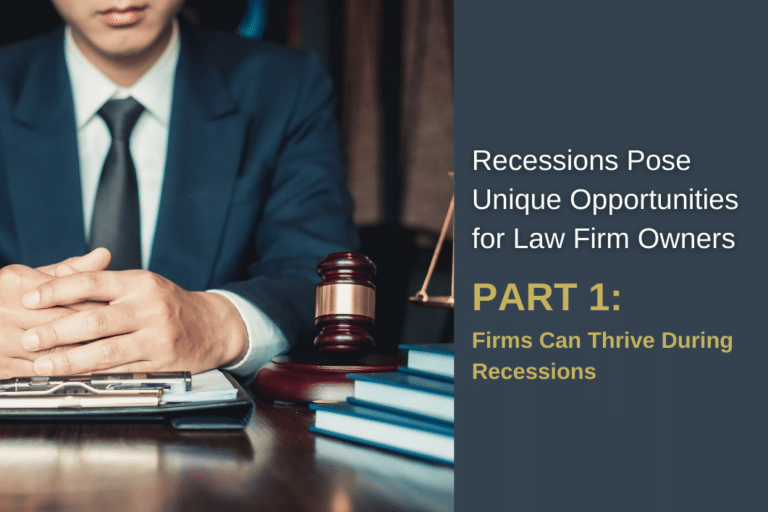Law firm profitability is a topic we’ve thought about extensively over the years, and, as we explain in our founding story article, is the key motivation behind starting our company in the first place.
While many law firms are good at growing revenue, they aren’t historically strong at monitoring and making sure profit after expenses stays solid. As we argue in the above article, this lack of focus on profitability is actually a leading cause of fundamental business model issues that are threatening the long term viability of the typical law firm.
But if a law firm buys into the argument that profitability is important, that we have historically neglected focusing on it, and that we need to focus on it now in order to build a long term, sustainable business model for our profession, how does a firm actually improve profitability?
We answer that in this article.
Below, we’ve consolidated some of the most significant (and commonly overlooked) lessons we’ve learned over the years on how to run a more profitable law firm, including:
1. Stick to Your Highest and Best Use, Delegate the Rest
2. Avoid Doing Non-Billable Work
3. Place a Heavier Emphasis on Increasing Realization Rate
4. Charge More with a Specialization or Sub-Specialization
5. Identify More Ways to Implement Technology
Note: We help law firms improve profitability and operate with reduced overhead via our nationwide marketplace, where attorneys can hire incredibly talented freelance lawyers (aka virtual associates) on a per project basis. Learn more and sign up here.
1. Stick to Your Highest and Best Use, Delegate the Rest
In order to boost profitability, lawyers have to find ways to only do the work that is the highest and best use of their time, and then figure out how to delegate the rest. A common misperception we see when lawyers are going through this analysis is that by delegating work to freelance lawyers, they are missing out on opportunities to bill their own time and make more money. However, as we’ll discuss in this section, that assumption is false.
The ethics rules, opinions, and case law all overwhelmingly say that attorneys may bill the services of freelance lawyers to their clients at prevailing market rates as long as the rate satisfies rule 1.5 — reasonableness requirement (which is based on geographics, practice area, and a number of other factors that we discuss here).
So what does this mean?
This means that solo attorneys and small firms can delegate work to freelance lawyers and leverage their time and talent to bring additional money into their firms, the same way that big law has been making fortunes off its legions of associates for decades by paying them the equivalent of, for example, $100/hour and their salary, and billing that associate’s work to the client at a higher number (i.e. over $300/hour).
This is a game changer in terms of small law firm profitability, and here are some numbers to make this come to life.
Let’s say you hire a freelance lawyer, aka a virtual associate, on our marketplace and they agree to write a motion for summary judgement for a flat fee of $1,000. When the freelance lawyer completes the project, they’re going to provide you a timecard, and that is automatically required and provided through our platform. Let’s assume the freelancer reports they worked 8.5 hours. And you determine based on their credentials and the type of case that a reasonable market rate is $200. This means that you can bill that freelancer’s time at a reasonable market rate to your client, and 8.5 times $200 equals to $1,700 billed to your client. While you paid the freelancer $1,000, you’re still generating an additional profit of $700 for your firm.
Now, imagine if you can replicate this on different types of legal work every week, every month, over the course of a year — that can generate a significant amount of additional income into your firm. Plus, it’s going to free up your own time to do the things that are better uses of your time and talents, like attending court, meeting with new clients, and so on. So it’s a win-win all the way around, especially when you find great freelancers that you can collaborate with time and time again, to get that work done.
Note: See this document with over a hundred legal work ideas (categorized by practice area) that attorneys could delegate to virtual associates on our marketplace on a per project basis, and consequently, make their law firms more profitable.
The Difference Between Delegating to an In-House Associate vs. a Freelance Lawyer
How is delegating legal work to a freelance lawyer different or better than just hiring associates and delegating to them?
The major benefit of freelance lawyers is that they don’t have overhead costs tied to them, unlike in-office, full time associates. In fact, as we explain in our founding story article, it’s one of the main reasons we started our company.
2. Avoid Doing Non-Billable Work
Many lawyers spend too much time on non-billable work, which ranges from infrastructure and admin, to tweaking with the website’s copy, and anything else that can’t be billed to a client. These are not the highest and best use of most lawyers’ time given their hourly rate. Instead, they would be better served delegating non-billable activities to the appropriate tech tools or outsourced team members (who can oftentimes do a better job). This frees up the lawyer’s time to do billable legal work, which typically generates more revenue for the firm.
Besides the fact that non-billable work isn’t usually as profitable, it can also weigh lawyers down by preventing them from having time to take on new clients, or reducing their leisure time out of the office.
3. Place a Heavier Emphasis on Increasing Realization Rate (Getting More Clients to Pay Invoices)
A low realization rate — the rate of clients who you bill that pay their invoices — can put a greater dent in profitability than many realize.
(Note: click here for more info on what realization rate means).
For every client you invoice, you incur the costs of working for them (mainly in your time spent and your associates, or freelance lawyers’, time spent) regardless of if the client pays. So, if you don’t collect on the invoice, the expenses are incurred by your firm with no revenue to offset them. That’s obviously disastrous for your profit margin.
But what most don’t realize is how much it hurts profit margin. Specifically, an increase in your realization rate by a given percentage, say 10%, from 85% of invoices collected to 95%, increases profitability by more than that 10%.
Why? Because 10% of revenue is always a larger percentage of profit because profit is always smaller than revenue (for all businesses that have expenses, including law firms).
We can see this using some simple numbers.
Say you make $100,000 in revenue in a given quarter and after an 85% realization rate plus some expenses, you keep half, so $50,000, in profit.
An increase in realization rate from 85% to 95%, or 10% of your $100,000 revenue is $10,000 extra that quarter. Since your profit was only $50,000, that $10,000 is actually a 20% increase in profit.
So it’s important to keep your realization rate as high as possible to maximize profit.
In addition, besides decreased profitability, taking on work and not getting paid for it is also terrible because you still have potential exposure for liability for malpractice. Also, if clients don’t pay you, unfortunately this isn’t a profession like marketing or creative fields where lawyers can immediately stop working. For instance, litigators who go to a judge on the eve of a trial and ask to get out of the case may not get approval.
So how do you increase realization rate, and consequently, improve profitability?
The number one tactic we’ve found to be helpful is: Don’t be afraid to require a retainer. If the client can’t pay for your retainer, it probably means they’re not going to pay your bill when it comes due. So requiring a retainer and using this as a filter will help you find clients who will pay. This is very likely to increase realization rate versus taking on any client and hoping after you send the invoice that they pay.
4. Charge More with a Specialization or Sub-Specialization
The next way to increase profitability is simple: while lawyers who are general practitioners can make a good living, if they add a specialization/sub-specialization in a certain area, then they can command higher rates.
For example, if you are a solo attorney or operate a small firm, and you and your partners are general lawyers who take on any type of work that comes through the door, there is likely a ceiling on the hourly rate you can charge (because clients are only willing to pay so much for a general lawyer that feels like a commodity and can be replaced by another general lawyer who charges a lower rate).
In contrast, if you focus on, again, your highest and best use of time and your marketing, positioning, and choice of clients are aligned with that, then you become known as the expert in that specialization/sub-specialization. Consequently, you can command higher rates (just as a cardiologist can charge more than a general primary care physician).
5. Identify More Ways to Implement Technology
Too many lawyers spend their valuable time doing tasks manually. Instead, here are some ways to automate processes and save time by implementing technology into your practice:
-
Add a chat bot to your website to help answer FAQ type inquiries from potential clients and keep you responsive 24/7.
-
Use online payment tools to collect retainer payments and assist your clients in paying their invoices faster and with a single click.
-
Use practice management systems to help you track your time, generate bills, and check for any client conflicts.
-
Use document automation software to streamline the time you spend customizing routine documents that you often use in your practice (such as agreements, pleadings, discovery and so much more).
-
The list goes on.
Note: We help law firms improve profitability and operate with reduced overhead via our nationwide, ethically compliant marketplace where attorneys can hire incredibly talented freelance lawyers (aka virtual associates) on a per project basis. Learn more and sign up here.









